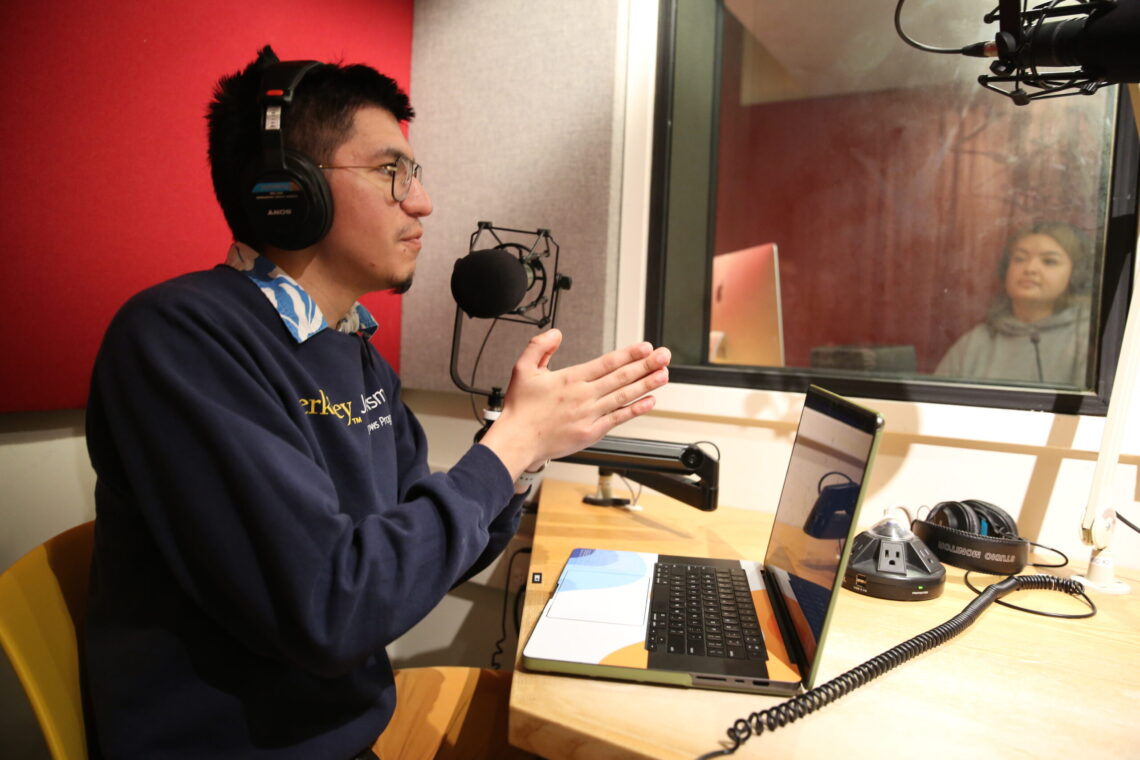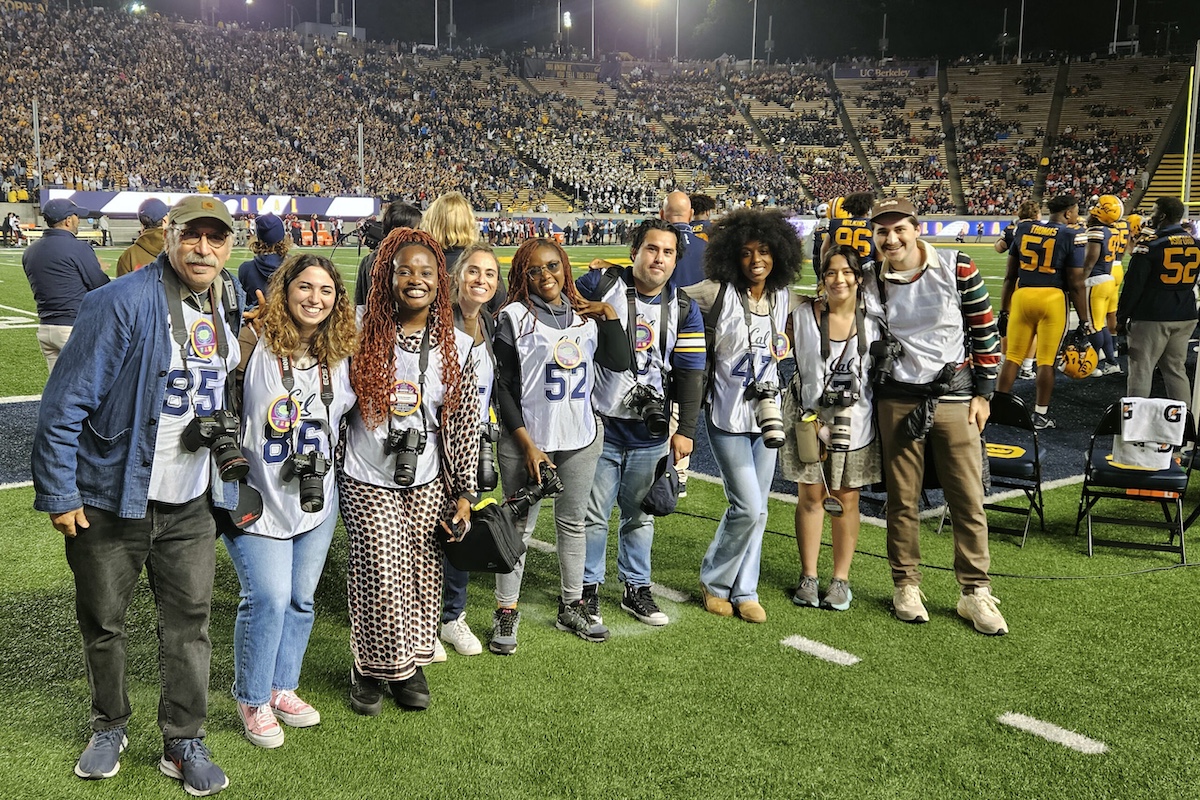Our two-year Master of Journalism program trains the next generation of diverse reporters to be fearless, innovative and technologically skilled. Gain hands-on experience, build a powerful portfolio and graduate ready to hold power accountable and tell the stories that matter most. We are currently accepting applications for Fall 2026 Graduate Admission. Begin your journey with us today!
Final Chance to Apply for Fall 2026 Admission is January 15!
Admissions Guide
Connect with Admissions
It's not too late to apply NOW and start your journey with us. We truly believe YOU can change the story, and we would love to connect!
Register in advance here to join our Virtual Drop-In Admissions Office Hours for one-on-one personalized support:
All times listed below are in Pacific Time (PT):
- Friday, Jan. 2: 11:00 AM-12:00 PM
- Friday, Jan. 9: 12:00-1:00 PM
- Tuesday, Jan. 13: 9:00-10:00 AM
- And more leading up through the day of the final deadline for Fall 2026 admission on January 15th!
Key Dates & Deadlines
Deadlines
- Round 1 (Priority) Deadline:
PASSED - December 1, 2025, 8:59 PM PT - Concurrent Degree Deadline:
PASSED - December 1, 2025, 8:59 PM PT
-Journalism & Master of Public Health (MPH/MJ)
-Journalism & Asian Studies (MJ/MA) - Round 2 (Final) Deadline:
January 15, 2026, 8:59 PM PT
Decisions & Enrollment Dates
- Final Decision Notification:
March 1, 2026 (For ALL applicants) - Enrollment Confirmation:
April 15, 2026 (SIR deadline)
Start Dates
- Start of Fall Semester: August 19, 2026
- First Day of Instruction: August 26, 2026
Download the Fall 2026 Academic Calendar (PDF) to learn more.
Program Overview
Student Work & Testimonials
Explore the work of our students and alums—published in outlets like The New York Times, Los Angeles Times, San Francisco Chronicle, Washington Post, NPR, KQED, Reveal, and more. You’ll also find groundbreaking projects on our Investigative Reporting Program (IRP) page, and innovative series like the Stakes Explained, a podcast and video project launched in response to the flood of new policies under the Trump administration. You can find more highlights of our incredible alums on our UC Berkeley Journalism website!
Why Choose Berkeley Journalism
Graduate ready to break stories, lead investigations, and shape the future of journalism.
Our industry-leading two-year program combines hands-on craft training with intellectual depth, guided by award-winning faculty and strengthened by unparalleled professional networks. With direct access to the Bay Area’s global media hub, you’ll gain the skills, experience, and connections to launch a powerful career.
Along the way, you’ll have access to standout opportunities: the Business Journalism Certificate (in partnership with Berkeley Haas and supported by Bloomberg Philanthropies), International Reporting (travel classes) in places like China, India, and Latin America (most recently Bogotá, Colombia), the Climate Journalism Lab, our acclaimed Investigative Reporting Program (whose goal is to change the face of who gets to do investigative reporting), and the opportunity to join the California Local News Fellowship post-graduation. Learn more about what makes Berkeley Journalism stand out as a leading J-School by following our latest news.
Top Reasons to Attend Berkeley Journalism
Berkeley isn’t just a journalism school—it’s a launchpad for fearless, impactful reporting!
Just the facts
64%
of incoming students are California residents
36%
of incoming students identify as coming from an underrepresented background
38%
of incoming students are first-generation college students
57%
of incoming students are students of color
How to Apply
Ready to shape the future of journalism? Don't delay and start your online application today!
IMPORTANT: Our upcoming and final deadline for Fall 2026 Graduate Admission is the Round 2 deadline on January 15, 2026. Please keep in mind, you may only submit one application per academic year and that the deadline has passed for our concurrent degrees with Public Health (MPH/MJ) or Asian Studies (MJ/MA). We encourage you to explore more detailed guidance on how to complete the Master of Journalism (MJ) application in this section of our Admissions page as well as on the Graduate Admissions website: Application Requirements & Admissions FAQs.
Concerning funding opportunities for Round 2 applicants, ALL applicants, regardless of which round they apply in, will be considered for our departmental merit-based and need-based funding opportunities (where applicable).
We look forward to receiving your application!
Requesting an Application Fee Waiver: We understand that application fees can be a barrier, and aim to support applicants for whom this cost presents a hardship. Please email us directly at journalism_admissions@berkeley.edu and/or check the "Application Fee & Waivers" tab below for more information on your eligibility, options, and next steps.
Application Components
Additional Requirements
Concurrent Degree, Documentary, International & Re-Applicants
Additional guidance can be found below to help all applicants ensure their application can be complete for consideration.
Policy on Use of Generative AI in Applications
At UC Berkeley Journalism, we are committed to an equitable and fair admissions process that evaluates each applicant’s authentic voice, critical thinking, and judgment as a journalist.
Applicants should not use generative AI tools (such as ChatGPT, Google Gemini, or similar programs) to compose, edit, or rewrite their application materials. These tools can unintentionally obscure an applicant’s individual perspective and abilities.
If you use AI tools in a limited way — for example, to generate ideas or check grammar — you must clearly disclose how and where they were used in your application.
Our goal is to ensure that all applicants are evaluated based on their own work and merit, reflecting the integrity and fairness central to the practice of journalism.
Connect with Us
Explore Berkeley Journalism your way, whether virtually or in person at our J-School, located at 121 North Gate Hall in Berkeley, California.
Please note, we are offering an array of select events with Virtual Drop-In Admissions Office Hours, based on current demand.
Upcoming Admissions Events
| Date | Event | Type | Location |
|---|---|---|---|
| Friday, January 2 11:00am-12:00pm PT |
Admissions | Virtual Drop-In Admissions Office Hours | Online | Register today! |
| Tuesday, January 6 10:00am-11:00am PT |
Admissions | Special Round 2 Application & Funding Workshop | Online | Register today! |
| Friday, January 9 12:00pm-1:00pm PT |
Admissions | Virtual Drop-In Admissions Office Hours | Online | Register today! |
| Tuesday, January 13 9:00am-10:00am PT |
Admissions | Virtual Drop-In Admissions Office Hours | Online | Register today! |
Campus Visits
Planning a visit to our campus? Please be sure to complete the Campus Visit Interest Form as early as possible before your trip. We are here to help you make the most of your time with us, whether sitting in on a class or two, meeting with the Director of Admissions for a one-on-one chat and J-School Tour, or booking a larger campus tour through UC Berkeley. We look forward to welcoming you here!
Please note that campus visits with the option to sit in on classes will resume after the UC Berkeley winter break on January 26, 2026, but you are always welcome to book a time to meet with the Director of Admissions in person at our J-School!
View Previous Sessions
For additional recordings, please visit the Berkeley Journalism YouTube Channel. You can also explore the 2025 Graduate Admissions Webinar Series (also on YouTube), covering topics such as navigating the graduate school application, re-entering academia, and student life in California.
In addition to YouTube, you are always welcome to follow Berkeley Journalism on Instagram, LinkedIn, Twitter (X), or Like us on Facebook, whatever your social media preference. We hope you'll continue to stay connected!








